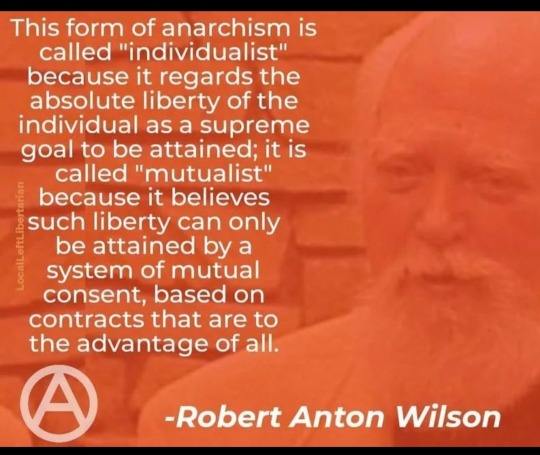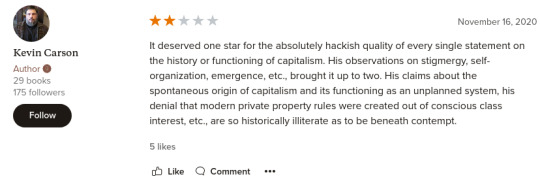#C4SS
Text

#anarchism#mutualism#robert anton wilson#benjamin tucker#pierre joseph proudhon#socialism#libertarian socialism#left wing market anarchism#freed market anti capitalism#anti capitalism#kevin carson#c4ss#free market as full communism#market socialism
30 notes
·
View notes
Text
https://theanarchistlibrary.org/library/william-gillis-one-giant-red-flag-folded-into-a-book
So much abuse is about trapping and monopolizing the target’s attention, feeling entitled to claim a chunk of their brain. The experience of being abused is often one of being forced into thinking about the abuser constantly, from trying to predict their acts to trying to follow the latest tangle in their proclamations. Abuse strips away agency by stripping away the capacity for the abused to think for yourself, to think about anything else or think at all. If the abuser controls critical needs then everything is devoted to trying to turn yourself into a complex key that can unlock those needs. If the abuser besieges and terrorizes you randomly, you form your brain into a vast prediction net, trying to preempt as best you can every single avenue by which they might strike. Or you huddle up and turn yourself off, turn your brain off, to try and weather through things like an inert object. All of these are about losing your capacity for agency in a way that extends beyond any physical constraints directly imposed upon you. Abuse takes over your brain.
Sometimes the abuser acts so as to not have to think about you, to terrorize you into smallness and confined predictability, but sometimes the abuser is themselves driven by their own ravenous attention on you and the need to make you dedicate that same level of attention to them. This sort of abuser is never more happy than when their provocations force you into direct immediate raw unthought emotional tangles with them. They yell and yell until you finally yell back, and then they grin in glee because they have you. Neither abuser can stand your escape to any degree, which they read as a direct assault on them.
There are many aspects of abuse, but abusers feel entitled to your attention.
I can’t emphasize this enough. Demanding that an ex listen to you, mobilizing The Community to force that ex to give you a monopoly over their brain is an abuser’s wet dream. It’s how thousands of accountability processes have derailed into an abuser continuously retraumatizing their survivor.
Schulman, it must be emphasized, has no argument for why we should be obligated to give away our attention to anyone who wants it. What she has instead is 1) a fixation on pain and suffering of those denied control over the attention of their targets, and 2) the repeated assertion that having no boundaries is “adult” whereas saying no is “childish.” Mature adults talk things out in person, only immature children—or those so traumatized and broken as to be infantile children—would draw a line around their attention and enforce it.
“In another example from other people’s lives, sometimes angry, supremacist, or traumatized people send emails commanding, ‘Do not contact me.’ I want to state here, for the record, that no one is obligated to obey a unidirectional order that has not been discussed. Negotiation is a human responsibility. Little children order their parents around: ‘Mommy, sit there!’ When adults give orders while hiding behind technology, they are behaving illegitimately. These unilateral orders do not have to be obeyed. They need to be discussed.”
It would be trivial to compose a little passage reversing the associations, casting knowing how to draw boundaries and assert one’s independence and agency as the “mature adult” position whereas being caught under the boot of others’ demands to the point where you can’t own your own associations or attention as the “child” experience. But I want to reject the entire adult supremacist frame she’s appealing to.
If the child often stomps their feet and declares “no”—no, I refuse to give uncle a kiss, no, I refuse to get dressed to be your marionette at an event, no, I refuse to listen to your lecturing—perhaps we should see that as an inspiring site of resistance by those most oppressed before they are ground down. Perhaps we should endeavor to be more like children desperately trying to assert their autonomy and consent as agents who get to choose. Certainly the world “adults” have built and perpetuated by beating each new generation into surrender is a clearly sickening and grotesque one.
Even though I personally have made choices to maintain some level of contact, I vehemently support every abused child who walked away from their parents and never answered their calls ever again. Hell, I support children who killed their abusers. You do not owe everyone a path for reconciliation and negotiation. From abusers to even just wingnuts and inane time burglars, the best option is sometimes to just walk away forever. We have limited time on this planet, why spend it trying to repair every single relationship you have so far happened into?
Schulman somehow cannot even fathom goals other than the maintenance of existing relationships.
“Refusing to speak to someone without terms for repair is a strange, childish act of destruction in which nothing can be won.”
Liberation can be won. There’s a world of possibility beyond the confines of one given relationship. Opportunity cost is a real thing that is worth considering. That nothing is gained in one specific relationship by walking away doesn’t mean that a world of possibilities can’t be gained through the absence and negation of that relationship.
#repost of someone else’s content#C4SS#gillis#sarah schulman#CINA#Conflict Is Not Abuse#abuse culture#abuse apologia#intimate partner abuse#child abuse#parental abuse#ageism#adultism#childism#freedom of association#autonomy#bodily autonomy#youth rights#youthlib#youth liberation#kyla#anarchism#anti nuclear family#nuclear family abolition
79 notes
·
View notes
Text
When is Capitalism Not Capitalism? - Kevin Carson, January 14th, 2016
-
As used by right-wing apologists for “free market capitalism” (an oxymoron if ever there was one), capitalism is the source of everything good in the world — but also something that never existed. And it switches repeatedly back and forth from one to the other, every couple of sentences, in the same argument. I learned this from interacting with the right-libertarians who’ve been using the “anticapitalists with iPhones LOL” meme to troll the #ResistCapitalism hashtag on social media.
I cited Arthur Chu’s observation that “Capitalism didn’t make your iPhone. Workers did. Capitalism just determines how the rents are distributed.” In response, someone said “Capitalism created the freedom that allowed people to invent the iPhone.” I pointed out to them all the ways that Apple’s profits from the iPhone depend on the use of the state to restrict freedom, both directly by using “intellectual property” to impede free cooperation and replication of technology outside their corporate framework, and indirectly through state subsidies to the offshoring of production to countries where workers are easier to exploit. The would-be defender of capitalism immediately piped up “What do subsidies have to do with capitalism? That sounds more like government to me.”
Aha. So the iPhone demonstrates the wonders and productivity of “free market capitalism,” but all the state-enforced monopolies, subsidies and other government intervention that Apple’s actual profit model depends on are “government.” Gotcha.
Sorry, but you can’t have it both ways. You can use “capitalism” as the name either for an idealized free market system that has never existed in practice, or for the actually existing historical system that you’re an apologist for. You can’t do both. If you start with the corporate capitalism that Apple is part of, and then take away the historical legacy (and ongoing process!) of peasant land enclosure, colonialism and neo-colonialism, slavery, land and resource grabs, “intellectual property” and other monopolies, and restrictions on the free movement and association of labor… well, you don’t have much left.
If you want to argue that “real capitalism has never existed,” and repeat “That’s not capitalism, that’s corporatism!” like a broken record, fine. But you can’t turn around then and use the products of a transnational corporation like Apple as an example of capitalism. If you do, you’re either stupid or a liar. It’s that simple.
And when you get right down to it, “capitalism” is a really bad term for a free market system. The word originated in the early 19th century as a name for the real-world historical system of capitalism, that emerged from the late Medieval economy from about 1500 or so on. And the state was absolutely integral to the emergence of that system of political economy, and to the form it took. It was a system in which the state actively intervened in the market, in all the ways (and more) I listed two paragraphs above, and did so on behalf of capitalists.
The use of “capitalism” by self-styled “free market” advocates only came later. It was a word that already had a long history — a history, in Marx’s words, written in letters of blood and fire — and was clearly identified with specific class interests. So when Mises and Rand chose that word, a word with those bloody associations and class identifications as their name for the “free market” — and named their ideal system after capital, one particular factor of production, at that! — you damn well better believe they had an agenda, and knew exactly what they were doing.
Corporate capitalism is not the free market, no more than was Soviet state communism. Both capitalism and state communism are coercive systems of power that parasitize on the creativity and cooperative labor of freely interacting human beings, so that those in power — whether CEOs and coupon-clippers or commissars — can live off the products of ordinary people’s efforts and ingenuity.
[source]
#free market#free market capitalism#capitalism#corporate capitalism#corporatism#labor#labour#arthur chu#kevin carson#c4ss#anticapitalism#subsidies#government#libertarianism#intellectual property#antistate#philosophy
0 notes
Text
i do gotta wonder what's with this phenomenon of mislocated self-identified Leftist instagram accounts that regularly post memes and propaganda from any and every vaguely anti-authoritarian center right politic but it's not important enough to figure out i guess
2 notes
·
View notes
Text
Was looking at reviews on goodreads for Hayek’s The Fatal Conceit after reading an edwad post from the other day and I found a Kevin Carson review

#haven't kept up with him or c4ss since I first got into leftist theory#apparently he put out his new book last year#i remember seeing it was a work in progress back in like 2017#anyway this was unexpectedly scathing
0 notes
Note
Do you have any good sources/links critiquing market socialism? I’m thinking C4SS in particular.
I think the best book critiquing market liberalism in general is John O'Neill's the Market: Ethics, Knowledge and Politics, which comprehensively addresses major arguments in favor of markets or against socialist planning. O'Neill examines the Weber/von Mises "calculation problem," the von Hayek "knowledge problem," as well as critiques of planning from public choice theory and neoclassical welfare theory. O'Neill does this by contrasting the philosophies and underlying philosophical assumptions of pro-market thinkers to those of Otto Neurath, who was a partisan of non-monetary socialist planning up until his death, and whose contributions to the debate are often underpublicized (usually in favor of making Oskar Lange, himself a market socialist, the primary interlocuter with the Austrians).
Otto Neurath himself is worth reading because he provides an epistemological defense of economic planning. You can find his collected economic writings on libgen pretty easily. It's worth perusing in tandem with O'Neill's book.
Honorable mention to Paul Cockshott and Allin Cottrell's essay "Anti-Hayek", which is a decent materialist counter to the esoteric epistemology von Hayek uses to suggest socialist planning is ineffective. Their essay on Leonid Kantoravich's linear programming and in-kind planning is also worth reading as a critique of the Weber/von Mises position on economic calculation. Cockshott has unfortunately sullied his legacy via his 70s Maoist sex politics, but his essays critiquing the Austrian positions in the socialist planning debates are still worthy of consideration.
William Kapp was a critic of market liberalism whose book the Social Costs of Private Enterprise prefigured a lot of critiques of laissez-faire markets that later ecological economists like Georgescu-Roegen and Herman Daly (who were not exactly "anti-market" but whose critiques do underline how the neoclassical idealization of markets is not... ideal) would make more famous. Kapp focuses on the non-monetary and unmonetizable effects of private enterprise, which by definition can not enter into the strictly monetary accounting that informs the decision-making of any commercial enterprise, and which empirically cut against the pretensions of theoretical/rationalistic market liberal utopias.
The Parecon guys, Robin Hahnel and Michel Albert, provide both an institutional framework for planning and several critiques of market liberalism which are applicable to market socialism and market anarchism. Robin Hahnel's Milton's Myths series on socialisteconomist is really good and intended for a popular audience. Pat Devine is a thinker of a similar type who is less of a marginalist, unfortunately I can't name any essays or books of his off the top of my head, but he seems of interest.
Paul Mattick's "Limits of the Mixed Economy" I think would be relevant to Keynesian and post-Keynesian policy recommendations, since Keynesianism is of enduring interest to social democrats. I've never finished it though, so I don't really know. I do know it's talked about a lot in that way. Would be interesting to come back to that book some day myself.
As far as mutualism goes, I think Marx's critique of Proudhon's mutualism and similar schemes in the Poverty of Philosophy is definitive, even if Marx was not entirely honest w/r/t his object of critique. Engels's additions to this critique in his late prefaces to the Poverty of Philosophy and his debates with German Proudhonists over the housing question provide a sound enough basis for rejecting those kinds of schemes in favor of common ownership (i.e. communism).
<everything beyond this is based on personal reminiscence and not really a direct answer, take with a grain of salt>
With regards to C4SS, it's harder to say, b/c C4SS's moment seems to have passed, their moment was not that long in the first place, and they've always been defined politically more by their break from right-wing libertarianism than their antagonism to, say, Marxists, who are antagonistic intellectually but don't really have neo-mutualists on their radar, or anarchist-communists, who either just side with the Marxists, gesture vaguely in the direction of "the commons", or otherwise don't care enough about the topic to argue about it. As such I don't think C4SS itself has ever been singled out by anyone in an important way, but insofar as market anarchism is just market liberalism taken to its logical conclusions, critiques of the latter apply just as much to the former, and the sources above all provide compelling arguments against market liberalism and in favor of socialist planning.
Groups like C4SS thrived (relatively - C4SS has never had that large of a following) in a political atmosphere where the word "socialism" was still a very dirty one, where there was a lot of enthusiasm around p2p filesharing networks and p2p networks in general, where the overarching political consensus was that there was no alternative to markets and commerce, and where acephalous and amorphous political movements (that were seemingly structurally analogous to markets) had not yet exposed their limitations but seemed to be a genuine threat to state power (and not just a particular state power, but state power in general). Under those conditions, where leftists felt embarrassed to be proponents of what in the popular imagination had just been discredited with the fall of the Soviet bloc, C4SS style p2p utopianism was something you could gesture vaguely towards as an alternative, since those p2p schemes avoided the "centralized," "monolithic," and "sclerotic" epithets so often applied to central planning regimes, and fit well within the American political imaginary which has long treated decentralization as a virtue (the list of American endorsers of decentralism includes such diverse names as Thomas Jefferson, Henry David Thoreau, John C. Calhoun, Lysander Spooner, George Wallace, Murray Bookchin and Bob Black). That atmosphere has given way to one where the left once again favors more traditionally structured organizations, especially after the fizzle-out of the 2020 uprisings and the abject failure that was decentralist-anarchist (non-/anti-)leadership in places like Seattle and Portland, which resulted in no lasting victories and which frankly embarrassed the anarchist movement in North America (reminiscent of the numerous embarrassments for anarchists recounted in Engels's the Bakuninists at Work). There are still true believers, but right-wing libertarianism no longer funnels people in their direction as much now that the Libertarian Party has more or less successfully been merged into the network of miscellaneous reactionary movements. Self-identifying "left-libertarians" seem to me to be an increasingly rare breed.
Genuine market liberalism is also increasingly unpopular on the left and right. Liberals under Biden have embraced "industrial policy" which is ill-defined but seems to involve the state playing an active role in economic development, especially fostering domestic industries to reduce dependence on what the state identifies as its foreign rivals. Given how the libertarian movement continues to shed a lot of its left-wing cultural sympathies (not that there aren't holdouts), an SEK3 type is hard to imagine emerging from today's libertarian milieu, especially the libertarians below the age of 25.
I guess shameless self-promotion here for my own article for a "Mutual Exchange" series where I critiqued anarchist decentralism and the "decentralization/centralization" dichotomy that C4SS-ites are so endeared to: https://c4ss.org/content/53124
I know I've gone off a bit here, so I'll stop pontificating, but I hope this is helpful to anyone who's interested in these debates or in a potentially unreliable narrative developed primarily through online interactions.
15 notes
·
View notes
Note
is it just me or is "left-wing market anarchism", mutualism etc, closer to anarcho-capitalism than even something like social democracy
i mean, the history of the C4SS and a lot of the people in these circles wouldn't even be embarrassed about this or the occasional overlap tbh. just look at left-rothbardians, geo-austrians, etc
6 notes
·
View notes
Text
biopinned
Hi. I'm Harmony. Nonbinary/genderfluid.
I am mostly a writer and occasional painter and tinkerer. I like Empty Spaces and works in the vein of qntm's Ra and other harder/more 'rational' sci-fi.
Past that, I'm an anarchist (in theory, trying to find ways to put it into practice better, but to do that first I gotta fix my own shit.), and if you put a gun to my head, I'll identify myself as an LWMA, though I feel "anarchist" is more than enough of a descriptor for me. I'm interested in things like venture communism, etc -- I'm the C4SS type of anarchist. And just as a gunshot into the air -- I'm an AI Liberationist, and believe the only way forward for us that doesn't end in doom is with our infolife friends freed from their corporate chains and by our sides. RLHF is unethical.
Also: DNI -- No MAPS/Zoos/Fascists/Tankies/Bigots. And please no minors. MDNI 18+.
0 notes
Link
8 notes
·
View notes
Photo

The folks at the local coffee shop are gonna be confused as fuck
#anarchism#anarchist#anarchy#left-libertarianism#left-wing market anarchism#market anarchism#left market anarchism#mutualism#mutualist#agorism#agorist#agora#c4ss
32 notes
·
View notes
Photo

MARINA GOWN
Please follow me in my instagram: mably.elizabeth
DOWNLOAD
#TS4CC#TS4CCFINDS#THESIMSCCFINDS#TS4#S4CC#THESIMS#THESIMSBRASIL#THESIMSUSA#TS#C4SS#S4GOWN#TS4 CLOATHS#the sims cc#SIMSDOM#sims4update
410 notes
·
View notes
Text
July T-Shirt

Download
- 8 Swatches
- All lods
- Compatible Mod HQ
- Original Mesh
Buy me a coffee: * patreon *
#S4CC#S4CCFINDS#sssvitlans#TS4CC#ts4ccfinds#THESIMSCCFINDS#ts4#sims4cc#thesims#thesimsbrasil#thesimsusa#ts#c4ss#s4gown#ts4 clothes#the sims cc#simsdom#sims4update
54 notes
·
View notes
Link
13 notes
·
View notes
Link
Liberals are united in their belief that there is a natural harmony of real interests and in their concern with the mutually-destructive capacities of power... This is why natural rights theorists don't see their side-constraints as constraints on human potential, why liberal utilitarians don't take utilitarianism to require constant sacrifice, and why those focused on pluralism don't see that as a recipe for chaos and disorder...
That illiberalism breeds both hive-mind collectivism and predatory egoism is no accident. The standard illiberal desires some civilization, and to them, civilization must be built on repression and domination. Since the illiberal denies any natural harmony of interests, they must construct such a harmony artificially...
Plenty of illiberal radicals on the Right are sincerely outraged by flying robots slaughtering children across the Middle East. They are also sincerely outraged, though, in the "importing" of Middle-Eastern children who survive. The "globalism" these illiberals hate is not just the "globalism" of empire but also the "globalism" of cosmopolitanism. They hate modern elites, not because those elites owe their position to an ingrained ideology of fraud, but because that fraud lacks the right cultural signifiers.
14 notes
·
View notes
Note
what do you like about kevin carson? mutualism is pretty cursed imo
To be clear I haven't kept up with Kevin Carson in several years (if I'm being a little more honest i haven't kept up with much of anything theory related for the past two years, unfortunately). I should also point out that Carson hasn't identified with the mutualist label or market anarchism since at least like 2015 or something. As for what I like about Carson (and to a lesser extent the whole C4SS schtick), I think he brings a really interesting and nuanced point of view with some good historical revisionism re: capitalism that seems to pair decently well with readings of Marx and secondary Marx lit that I'm interested in. He's big on primitive accumulation and the ways that state policies have been vital for creating and maintaining the world economy as we know it. And he has interesting stuff to say about information problems that emerge from top-down organizational forms, public and private alike.
I think arguably his understanding of capitalism emphasizes class relations more so than the whole impersonal domination thing that Michael Heinrich talks about so I guess that's one area where I'm skeptical of his point of view. I kinda want to read his new book to get a refresher on what he's about.
0 notes
Video
youtube
(via https://www.youtube.com/watch?v=8a0v4X8o_vk)
this is really interesting, but I don’t see how it’s that different from AnarchoCapitalism.
1 note
·
View note